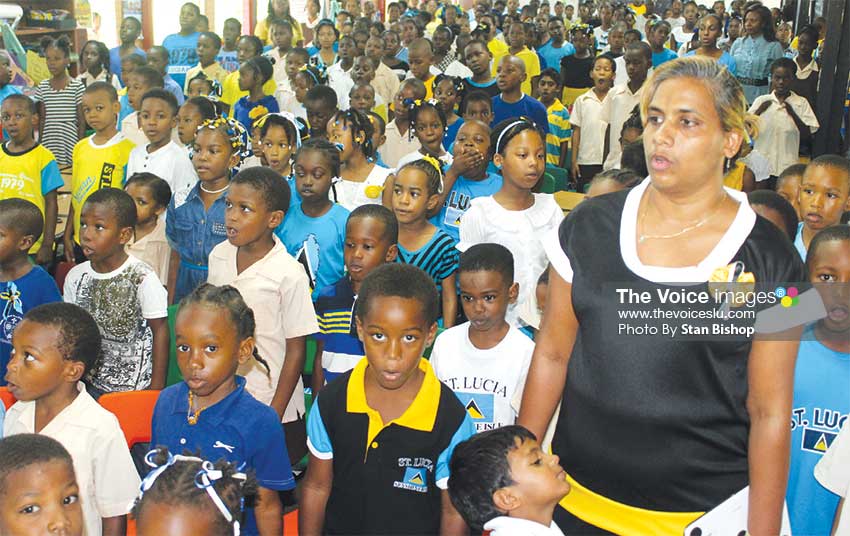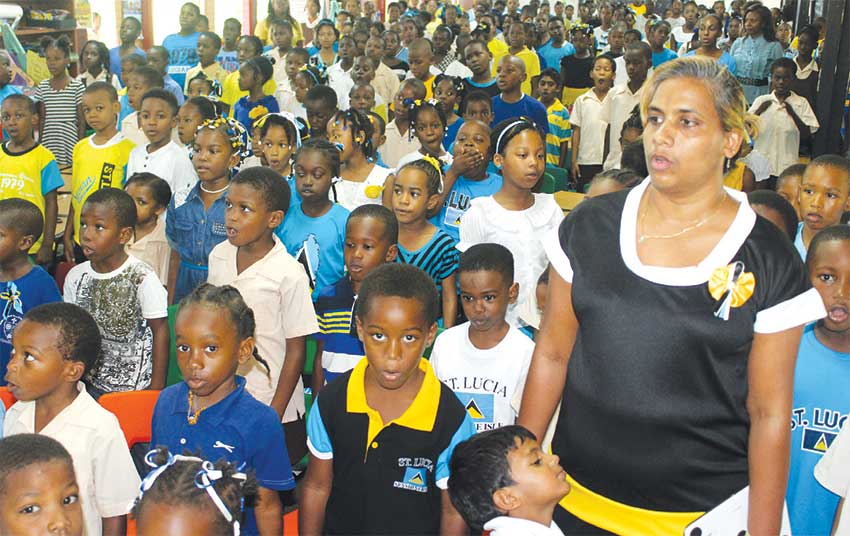A move is afoot that may roll back years of injustice against children entering school whose first language is the French Creole spoken widespread in the country but not taught in schools.
This injustice, conducted by the Government of St. Lucia, particularly by the Department of Education, has over the years caused many St. Lucians to fall by the wayside because of the system’s labelling them as under-performers or under-achievers.

An understanding of the injustice to these children meted out by the government could be gleaned from classrooms across the country where children are taught to be fluent in creole at home.
These children, most times, have good oratorical skills in the creole language and can operate within it very well and, in some cases, fully competent in it. However, in the school system, a child’s first language has never been taken into consideration, in terms of language education. Teachers feel that all children entering their classrooms can speak English. What most teachers fail to realize is that some of those children cannot speak or comprehend English fluently.
The VOICE was able to confirm from educators that the Department of Education has been aware of the problem for years but the Government never exercised the will to address the matter by working to adopt an approved National Language Policy — the answer, some educators believe — that would have helped those children with creole as their first language excel at school.
Government, though, recognizing the critical role to literacy education a child’s first language plays, has over the years consistently ignored the work of local education specialists, some of them giants in the fields of linguistics and language policy, on the matter leading to schools repeatedly labelling brilliant children with creole as their first language under-achievers or under-performers.
Those specialists have written concept papers, discussion papers and draft policies on the subject — all now hidden in cupboards or lying on shelves collecting dust.
Now, all that is about to change, starting with a workshop last week in the conference room of the Golden Palm Hotel, where teachers, educators, principals, researchers, linguists, specialists in the local languages, recognized that although literacy and language education are specialized fields, general education will now have to take on that body of language as part of its mainstay.
They decided to take on this gap in the education system and bring it to national policy level, something unheard of before. The link needed to bring the matter to policy level was finally found – the enthusiasm and determination of an education minister. Education Minister Dr. Gale Rigobert provided educators with the missing link and they are excited.
“I really want to say thanks to our (Education) Minister. Our Minister is very passionate about the whole idea of a language policy for St. Lucia because she recognizes that we can’t go anywhere and will continue to see poor literacy achievements scores if we don’t adjust our instructional approach,” said Yosha Alphonse, Curriculum Specialist for English in the Department of Education.
“We are working on getting a language policy drafted and, with the support of the Minister, seeing it ratified in Cabinet,” Alphonse added, noting that the policy cannot be enacted without a policy education plan.
She called on teachers to begin appreciating the first language of all children in the classroom, the first step in an implementation plan to change things around. Alphonse recognized the mammoth task ahead in implementing the policy plan, seeing that there are many teachers who cannot speak far less teach in the creole language.
“There are issues that we need to address but we have to start somewhere and that is why the Teachers College is on board and very soon the college will be offering French Creole as a language course,” Alphonse said.
The first quarter of next year is the tentative time given for the complete drafting of the approved National Language Policy.
The Education Department of the OECS Secretariat, initiators of the early learners programme, is providing support for the policy’s development. The Secretariat recognized the disadvantages faced by children coming into classrooms with creole as their first language and so initiated an Early Learners Programme to improve the reading achievement levels of all learners during the early primary grades.
The programme is implemented among Kindergarten to Grade 3 students and their teachers in the six independent OECS Member States and specifically seeks to: Developing teachers’ capability to assess and to teach reading to children at the early grades of primary school; Improving teacher competence in the use of diagnostic tools for the early assessment of children at risk of low achievement in reading at the primary level; Introducing appropriate language of instruction to teach reading at the early grades; Securing adequate instructional and practice time to reading in and out of school; Developing and adopting/adapting as appropriate, teaching resources and learning materials for reading; Designing, developing and adopting appropriate intervention strategies for at-risk children; Designing and implementing a programme of assessment which provides better guidance for addressing student needs; and Making innovative use of ICT in the management and delivery of literacy improvement programmes across the OECS.
According to the Secretariat, the OECS intends to harness and focus commitment in a concentrated regional effort to achieve set learner outcomes across OECS education systems. It outlines a shift towards addressing emerging trends among OECS States which were established in an analysis of the state of education.
Seven strategic imperatives for improving education were identified as priorities which are reflective of national priorities. Each imperative contributes to strengthening different aspects of the education system. Additionally, the plan entails several development issues which are identified as cross-cutting themes which are addressed through the strategic imperatives, one of which relates to improving the levels of literacy, numeracy and technology among all learners.
Poor performance in English Language and Mathematics continues to be an area of major challenge for educators and policymakers in the OECS region. At the early grades, approximately 50% of students score below the national average in Mathematics and about 40% are under-performing in English Language. This situation is further compounded as there is an achievement gap between male and female performance throughout the primary school years.
The Secretariat notes that there is a critical role for improving children’s abilities in reading, writing and mathematics if the region is to realise the vision – Every Learner Succeeds. Thus, as the region commences the implementation of the new education strategy, priority will be given to instituting measures to address these critical areas.
During the period of implementation, the OECS Secretariat will pursue several avenues to address what is clearly an undesirable situation in the education system. This proposed project is the first initiative under the new strategy to address aspects of policy and practice that are essential to improve student learning at early primary.







![Attendees at the UHC logo and website launch [Photo credit: GOSL]](https://thevoiceslu.com/wp-content/uploads/2026/02/Attendees-at-the-UHC-logo-and-website-launch-380x250.jpg)






![Remnants of an alleged drug boat blown up in a lethal strike by the U.S. military last week surfaced off Canouan on Saturday [Photo credit : St Vincent Times]](https://thevoiceslu.com/wp-content/uploads/2026/02/Remnants-of-an-alleged-drug-boat-blown-up-380x250.jpg)
